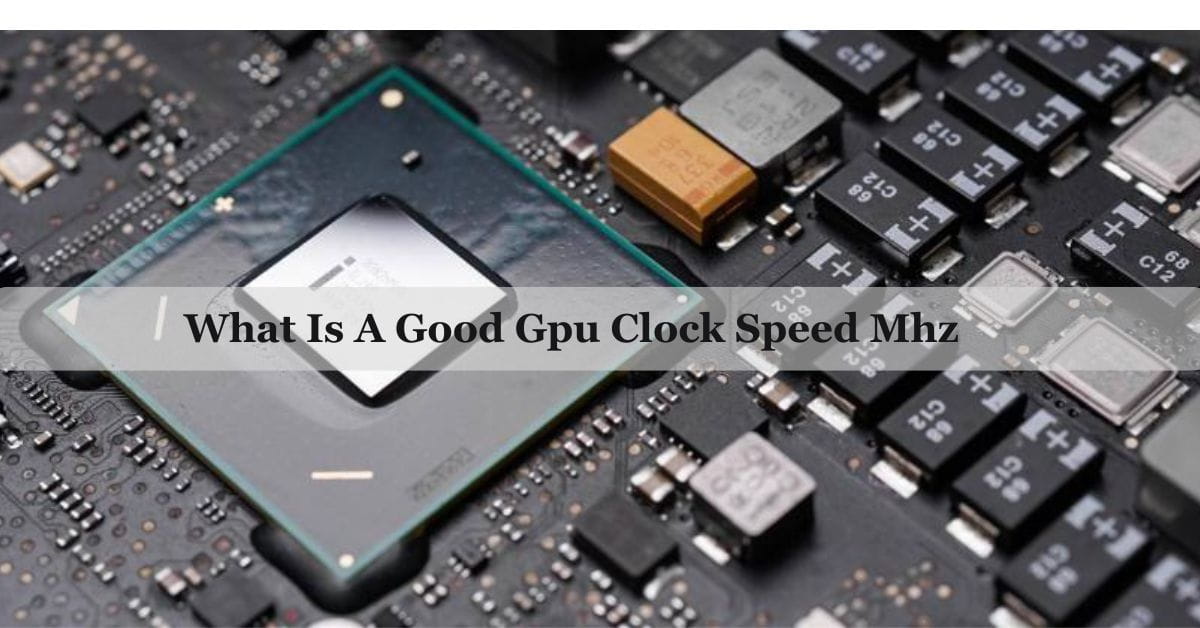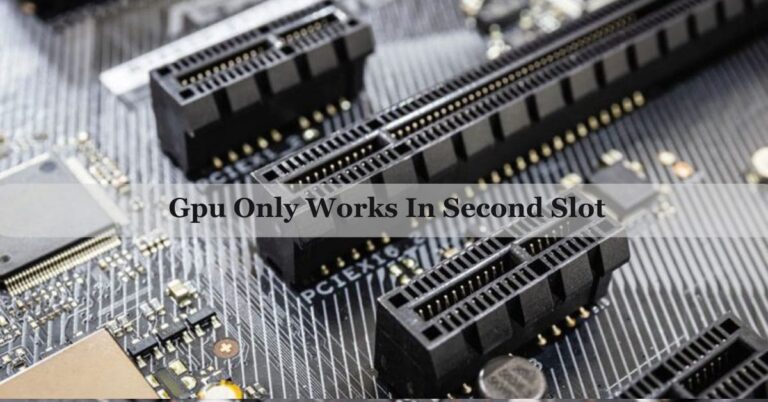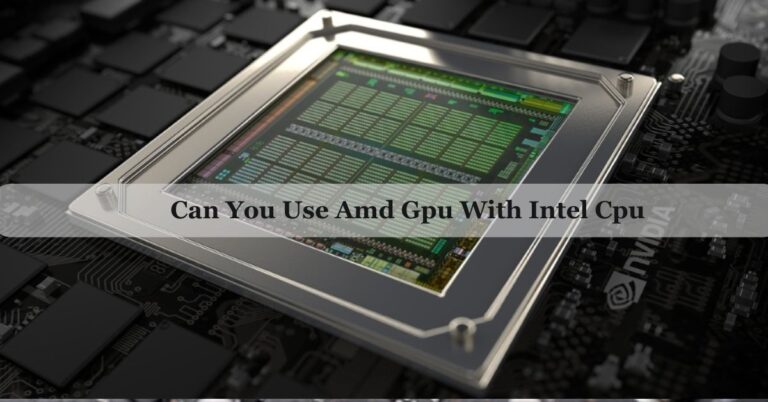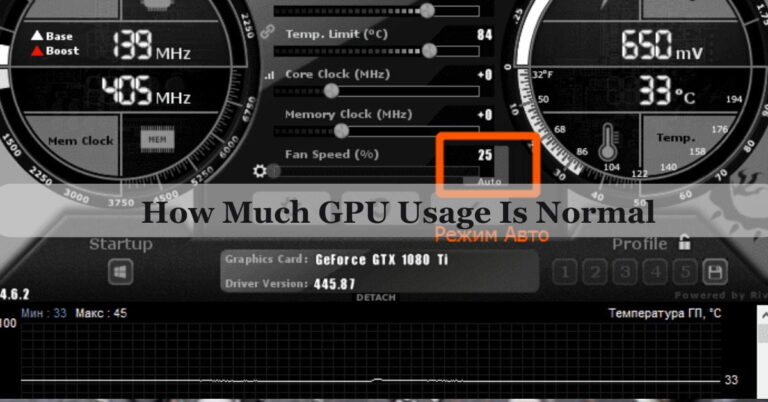What Is A Good Gpu Clock Speed Mhz – Upgrade Your Knowledge Today!
When I upgraded my GPU to one with a boost clock speed of 1,800 MHz, my games ran much smoother, and my video editing was faster. It made a big difference in my daily tasks and gaming experience.
A good GPU clock speed is usually between 1,500 to 2,000 MHz. This range helps games run smoothly and improves performance in tasks like video editing. Remember, higher speeds can give better performance but may need good cooling to prevent overheating.
Are you curious about what is a good gpu clock speed mhz? Understanding GPU clock speeds can help! In this article, we’ll break down what a good GPU clock speed is and why it matters. Whether you’re a gamer or just love great visuals, read on to find out how to get the best performance from your GPU.
Does Gpu Clock Speed Matter For Gaming?
Yes, GPU clock speed matters for gaming. It affects how fast the GPU processes graphics, which can make games run smoother and look better. Higher clock speeds can improve frame rates and reduce lag, especially in demanding games.
However, other factors like the number of cores and memory also play a big role, so a balanced GPU with good clock speed and other features is best for gaming.
Gpu Clock Speeds :
GPU clock speed is how fast the graphics processing unit (GPU) runs, measured in megahertz (MHz). It shows how many cycles the GPU can complete in one second. Higher clock speeds mean the GPU can handle more tasks quickly, making games and graphics run smoother.
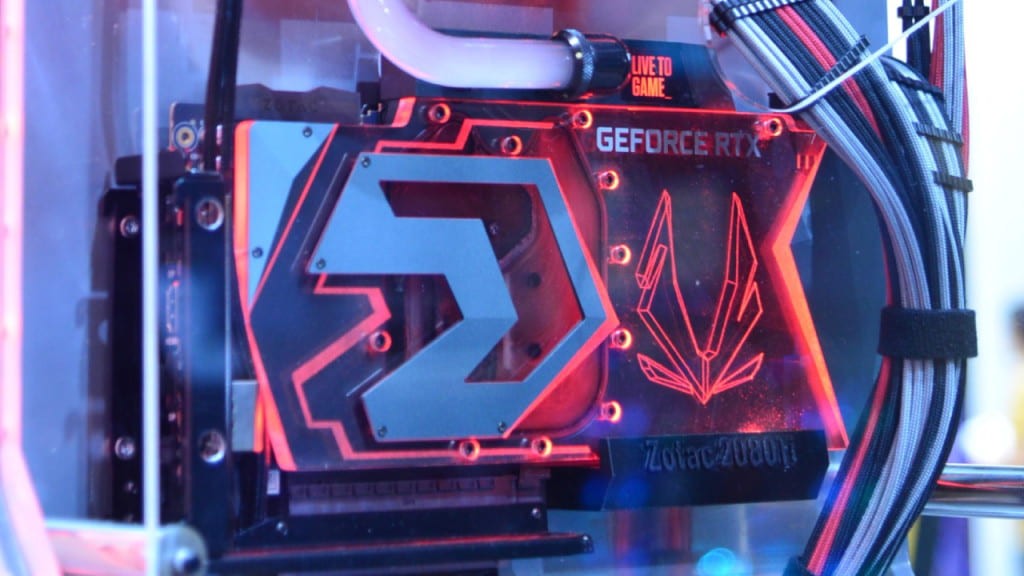
What Is A Good Gpu Clock Speed Mhz?
A good GPU clock speed typically ranges from 1,500 to 2,000 MHz. This speed helps your computer handle games and graphics tasks smoothly. Higher clock speeds mean the GPU can process more data quickly, making your games look better and run faster.
High speeds can also generate more heat, so good cooling is essential to keep everything running smoothly. Always balance clock speed with cooling to get the best performance without overheating.
Also Read: What Gpu Is Compatible With My Motherboard – Ultimate Guide Of 2024!
What Is Normal Gpu Utilization And Core Clocks?
GPU Utilization and Core Clocks are two important aspects of how your graphics card performs.
GPU Utilization:
GPU Utilization shows how much of the GPU’s power is being used. It’s measured as a percentage, where 100% means the GPU is working at full capacity. For normal gaming or tasks, a GPU utilization of 70-90% is common. If it’s too low, your GPU might not be used fully, and if it’s too high, it might be struggling.
Core Clocks:
Core Clocks refer to the speed at which the GPU cores operate. It’s measured in MHz (megahertz). The base clock is the standard speed, while the boost clock is the maximum speed the GPU can reach under heavy load. Normal core clock speeds vary by GPU model, but higher speeds mean the GPU can handle more tasks quickly.
How Much Do Gpu Clock Speeds Matter?
GPU clock speeds are important because they affect how quickly your graphics card can handle tasks like gaming and video editing. Higher clock speeds mean the GPU can process more data every second, which can lead to better performance and smoother experiences in games.
Other factors, like the number of cores, memory, and cooling, also play a big role. So, while higher clock speeds can help, a balanced and well-rounded GPU with good specs in all areas is the best for overall performance.
How Many Mhz Does It Take To Make A Performance Difference For Gpus?
For GPUs, a difference of around 100-200 MHz can have a noticeable impact on performance. If you increase the clock speed by this amount, you might see smoother gameplay or faster processing in tasks like video editing.
Bigger increases, like 500 MHz or more, can lead to much better performance but also require better cooling. While MHz is important, it’s also essential to have a good balance with other features like memory and cooling for the best results.
What Is Better For A Gpu?
A good GPU should have a balance of high clock speeds, many cores, and plenty of memory (VRAM). High clock speeds help with fast processing, many cores handle more tasks, and more memory helps with bigger games and projects. Also, good cooling is important to keep everything running well.
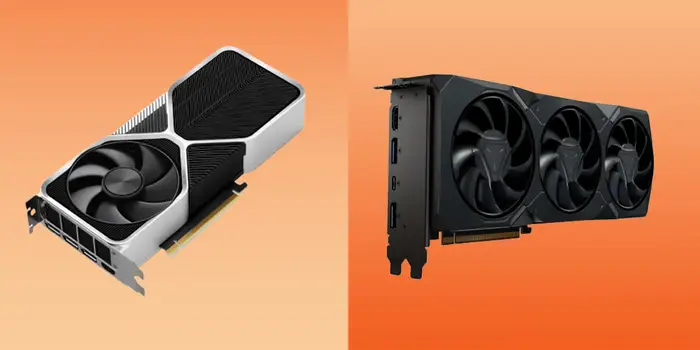
When It Has More Mhz In Memory Clock Speed Or Less?
1. More MHz in Memory Clock Speed:
- Better Performance: Higher MHz means faster memory speeds. This helps the GPU handle larger and more complex games or applications more efficiently.
- Smoother Gaming: Games and programs can run more smoothly with higher memory speeds, reducing lag and stuttering.
- Faster Data Access: More MHz means the GPU can access and process data from the memory more quickly, which is important for high-resolution graphics and multitasking.
- More Power Usage: Higher speeds use more power, which may require better cooling solutions to prevent overheating.
2. Less MHz in Memory Clock Speed:
- Lower Performance: Lower MHz means slower memory speeds. This can lead to less smooth gameplay and slower performance in tasks.
- Reduced Data Handling: The GPU may struggle with large files or complex graphics, making games and applications run slower.
- Less Power Usage: Lower speeds use less power and generate less heat, which can be easier on your system’s cooling and power needs.
- Cost-Effective: GPUs with lower memory clock speeds are often less expensive, making them a good choice for budget systems.
Also Read: Can You Use Amd Gpu With Intel Cpu – Enjoy The Performance!
Is Higher Gpu Clock Speed Better?
Yes, a higher GPU clock speed is generally better because it means the GPU can process graphics faster. This leads to better performance in games and applications, with smoother visuals and quicker responses. Higher speeds can also increase power use and heat, so good cooling is important to avoid overheating.
Is It Bad That My Gpu And Mem Clock Are Max All The Time?
If your GPU and memory clocks are maxed out all the time, it can be a problem. It means your GPU is working at full power, which can cause overheating, higher energy use, and faster wear over time.
It’s normal during heavy tasks, but for everyday use, high clocks might mean there’s an issue. Make sure your cooling system is good and check if you can lower the settings to avoid long-term damage.
Gpu Memory Clock Speed Vs Gpu Core Clock Speed:
GPU Memory Clock Speed and GPU Core Clock Speed are two important aspects of how a GPU works, but they do different things.
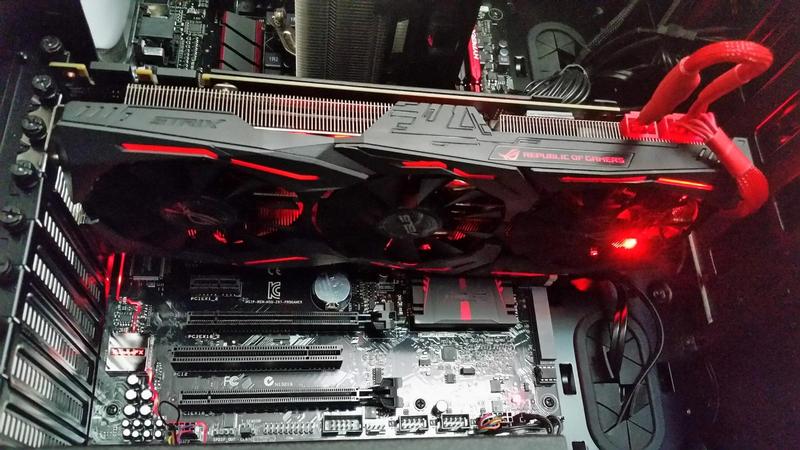
GPU Core Clock Speed:
This is the speed at which the GPU’s cores process data. Higher core clock speeds mean the GPU can handle more tasks per second, which helps with faster graphics rendering and better performance in games.
GPU Memory Clock Speed:
This is the speed at which the GPU’s memory (VRAM) reads and writes data. Higher memory clock speeds mean the GPU can access and use more data quickly, which is important for handling larger textures and complex graphics.
Also Read: Runtimeerror: Gpu Is Required To Quantize Or Run Quantize Model. – Read Our Guide!
What Is A Safe Gpu Clock Speed?
A safe GPU clock speed is one that keeps your graphics card stable and cool under heavy use. It varies by GPU model and cooling setup, but generally, staying within the manufacturer’s recommended limits is safest. Monitor your GPU’s temperature and stability while testing higher speeds. Avoid pushing it too far to prevent overheating, crashes, or long-term damage to your hardware.
Is Higher Mhz Better For Gpu?
Yes, higher MHz is generally better for a GPU because it means the GPU can process graphics and tasks faster. More MHz can improve gaming performance and speed up tasks like video editing.
It’s important to balance high MHz with good cooling to avoid overheating and make sure the rest of your GPU’s features, like memory and cores, are also strong. So, while higher MHz helps, it’s just one part of what makes a GPU good.
Is 2000 Mhz Good For Gaming?
Yes, 2000 MHz is generally good for gaming. A GPU with a clock speed of 2000 MHz can handle most modern games with high settings and smooth performance. It helps achieve better frame rates, clearer graphics, and fewer lags.
To get the best results, make sure you also have enough memory (VRAM) and good cooling for your GPU. So, while 2000 MHz is a strong speed for gaming, it works best as part of a well-balanced gaming setup.
Also Read: Red Light On Gpu When Pc Is Off – Don’t Panic, Check This Now!
Base Clock Vs. Boost Clock:
Base Clock and Boost Clock are two important measures of a GPU’s performance:
Base Clock:
This is the standard speed at which the GPU operates under normal conditions. It’s the minimum guaranteed speed and ensures stable performance across all tasks.
Boost Clock:
The boost clock is the maximum speed the GPU can achieve when conditions allow, such as when there’s enough power and cooling. It dynamically increases performance for demanding tasks like gaming or video rendering.

FAQs:
1. What Is A Good Gpu Clock Speed In Mhz?
A good GPU clock speed is usually between 1,500 to 2,000 MHz for most users. Higher speeds can improve performance in games and apps.
2. What Are Typical Gpu Clock Speeds?
Typical GPU clock speeds are around 1,000 to 2,500 MHz depending on the GPU model and type, with base clocks lower and boost clocks higher.
3. How Does Clock Speed Affect Performance?
Higher clock speeds make the GPU process data faster, which can lead to better performance in games and applications.
4. How To Balance Clock Speed, Power, And Heat?
To balance clock speed, power, and heat, use good cooling solutions and increase clock speeds gradually while monitoring temperatures and stability.
5. Can I Change My Gpu’s Clock Speed?
Yes, you can change your GPU’s clock speed through overclocking using software tools, but do it carefully to avoid overheating or damage.
6. What Is Thermal Throttling?
Thermal throttling is when the GPU slows down to cool off if it gets too hot, which can reduce performance to prevent damage.
7. Can My Gpu Clock Speed Change Automatically?
Yes, modern GPUs can automatically adjust clock speeds based on workload and temperature to balance performance and cooling.
8. How Can I Compare Gpu Clock Speeds Between Different Brands?
To compare GPU clock speeds, look at the base and boost clock speeds listed for each GPU model from different brands.
9. Does Gpu Clock Speed Affect The Lifespan Of The Gpu?
Yes, higher clock speeds can increase heat and power use, which might reduce the GPU’s lifespan over time.
10. Is A Gpu With A Higher Clock Speed Always Better For Gaming?
A higher clock speed helps with gaming, but it’s not the only factor. A balanced GPU with good memory, cores, and cooling is also important for the best gaming experience.
Final Words:
In conclusion, a good GPU clock speed ranges from 1,500 to 2,000 MHz for most users. Higher clock speeds improve performance in games and tasks, but they also generate more heat. Balancing clock speed with good cooling ensures smooth, efficient performance without overheating. Always consider other factors like memory and cooling for the best overall results.
Related Posts:
- Is Beamng Cpu Or Gpu Intensive – Conquer Both!
- Is World Of Warcraft Cpu Or Gpu Intensive – Ready To Boost WOW Gameplay!
- Does Amd Gpu Work With Intel Cpu – Start Reading Now!
- Is 60 Degrees Celsius Hot For A Gpu – Safe GPU Temperature!

James George is a GPU expert with 5 years of experience in GPU repair. On Techy Cores, he shares practical tips, guides, and troubleshooting advice to help you keep your GPU in top shape. Whether you’re a beginner or a seasoned tech enthusiast, James’s expertise will help you understand and fix your GPU issues easily.

